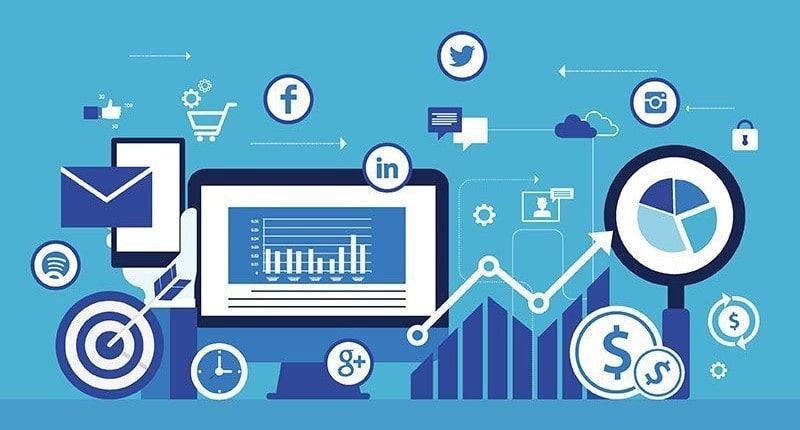Web Crawling Use Cases and Business Applications
The web is so full of information, information that can transform your business. While you read this article many more terabytes of data would be uploaded. Data that can potentially fuel business decisions and strategy making. Businesses around the world are becoming data-centric as data enables your executive(s) to make accurate and intelligent decisions. In-fact if captivated properly, data can put you way ahead of your competitors.
This article is about how businesses are leveraging web scraping. Web scraping is extracting or collecting business critical data available on the web using software tools called crawlers ( also known as spiders ). Basic functionality of these data extraction bots is to copy data from websites and store it into a database which can be a SQL, NoSQL (Mongo, DynamoDB etc) database or any other database that your enterprise uses / prefers.
Note : Extracting data from websites is of-course beneficial for the party extracting it, but the target website may not always be okay with it. Esp, for small businesses with limited bandwidth, it can result into server failure. There are ways in which you can safeguard your site from getting crawled by unwanted parties.
Transforming businesses, staying ahead of competitors, intelligent decision making.. all this must be sounding like a fairy tale, right? FYI. It is not a fairy tale. Enterprises across industry verticals are banking on mammoth amount of data to gain insights about customer preferences, to take data-backed marketing decisions, optimize business processes, improve their product and what not.
In this article we will also introduce you to some of the most powerful and efficient web scraping frameworks and tools like Scrapy, BeautifulSoup, Selenium etc. But first, we detail a few most prominent use cases of the web scraping ( data crawling ) for data-first modern businesses.
Business use cases of web scraping ( data extraction )
Data scraping use cases can be found across industry verticals. Web scraping mainly involves collecting data about your business competitors (industry trends), products pricing (price monitoring) and customer’s feedback (reviews) about products and services. The core business proposition of web scraping, as mentioned already, is deriving insights from data to assist CXOs in intelligent decision making.
You may find direct application of web crawling in data-centric businesses and processes i.e., Lead Generation (Sales), Stock Markets (Finance), Research and Investigative Journalism (Media), Tourism and Hospitality (Travel), Retail (e-commerce) businesses etc.
Benefits of data extraction is not just limited to these industries. Even various government organisations can scrape data for different use cases. Also Insurance sector and healthcare companies can leverage data scraping.
Read about : continuous integration continuous delivery with fastlane
Data engineers use it in artificial intelligence and machine learning to train AI and ML models, process this data to represent it in the form of graphs (data visualisation) etcetera. We now discuss some of these web scraping use cases in detail –
Lead generation
Business is all about selling innovative quality products & services that makes life easy and comfortable. But finding quality prospects is a real pain, especially for B2B businesses. We’re well aware that every sales team is tired of searching the web for contact information of the prospective client. Therefore many enterprises end-up subscribing to business listing directories but that too disappoints. Even if some company finds a reliable source for contacts, they still have to manually copy/paste prospects data, filter it for quality prospects and then forward it to sales team. This process is time consuming and also creates a heavy dent on company’s finance.
Read about: MERN STACK DEVELOPMENT : RIGHT TECH CHOICE FOR YOUR WEB APP?
We understand these problems and have got good news for you. Web scraping tools can not only automate this whole process of contact data extraction from the internet but can also be of relief to the finance team by cutting costs as you don’t have to hire people for manual lead generation. Aren’t you in “WOW!!!” mode after reading this? Some might also be in “HOW???” mode on reading this. So let’s discuss that.
Web scraping programs when deployed properly can collect data from lead generation sources (social media, websites, business listing directory, search engines etc.) to find potential leads and store the collected data in some database. When we say “deployed properly”, we mean to say implementing with proper logic to find hot leads and filter out unqualified leads.
You can leverage other marketing tools (open sourced or custom developed) to automate the rest of the process. Say, you scraped emails and store it in mongoDB on some serverless environment. Then you can have some software deployed that automatically fetches email IDs and fires an email to newly crawled/added prospects in the database. Your sales team now only has to deal with hot prospects ie., high quality convertible prospects for the final sales pitch. Told you, it’s not a fairytale. Data Science and Robotic Automation Process (RPA) is solving some really daunting and boring real life problems, to be specific, business problems!
Stock Markets
Hedge fund managers and asset management agencies too can leverage web crawling and data extraction. When we hear the phrase “stock market” or read it somewhere, the first thing that comes to your mind is MONEY. But there are also some other words that strikes our mind. For example : investment, fundamental analysis and technical analysis. No one can make money in market by doing wrong investments and to make right Investment one needs to do either fundamental analysis or technical analysis or both.
Read about: RETAIL DIGITAL TRANSFORMATION TRENDS & HOW CODEWAVE CAN HELP YOU
Did you notice? We just wrote “analysis” 5 times. Share Market is all about analysis. Analysing data that can directly or indirectly influence market. Isn’t it obvious that to analyse data you first need to have data. Only then you can deploy your preferred mechanisms to analyse that data.
Web scraping or web crawling enables you to scrape market indexes, a group of stocks, a specific one, or all of them depending on your needs. Of-course, when you’re reading this you must would be a finance sector Ninja. You would also be knowing that having data about stock indexes can help you in monitoring market trends, industry trends etc. So, we won’t cover all those things in this article else it would become a reading marathon.
Basically, you can scrape data from any website (esp finance sector) that would help you in equity research. Such data could get you insights about company’s business plans, financial information and keeps you updated on risk mitigation and compliance defaulters of your target industry. You may also be interested in scraping financial news websites for analysing and predicting market sentiments. In short, stay ahead of competitors and other investors.
Research and journalism
Journalists always crave for new stories, breaking news and they want to be the first one to report it. Researchers are no different. They too want to be the fastest to report a new finding. In order to achieve this they need data from as many number of reliable source as they can.
In-fact, you can leverage modern governments that are going the open source way by making the data related to governance and bureaucracy available to public i.e., transport data, medical data, health and education data etc. Canada is one such country. But these are hardly in the format that journalist are comfortable with. Scraping is again the solution.
Web scraping use cases for journalism involves extracting data from this government sites and all other sites whose data can potentially help journalists in identifying and cracking the next big story or uncover some hidden dark truth. Journalists/researchers besides crawling this government data could also scrape old/latest news on a particular topic, press releases, press conferences etc.
Tourism hospitality and retail business
We kept this section for the last because web scraping / crawling and data extraction is most exploited in these two business domains i.e., travel and retail business. In tourism and all other sort of e-commerce businesses price is a significant factor beside product and service quality that decides the success of any enterprise.
Travellers around the globe have been observed to research about their upcoming trip prior to travelling. They look for reviews by other travellers, reviews about resorts, food, hospitality, airline services, restaurants etc. In-fact they research about everything which is there on their bucket list.
It’s a no brainer to win in these segments you’ve to serve your customer with most comprehensive information. Traditional methodologies to collect and avail this reviews data, destination details are not fruitful anymore. Also, the price of hotel rooms and airline fare extra keep changing every now and then.
Travel agencies should be updated about any changes in order to provide the best service to their customers. Web scraping could make life so easy for these travel agencies. Crawler programs can automatically collect data about reviews, ratings, most liked/disliked tourist attractions etc.
Database driven crawlers can automatically schedule regular crawls for details about price which keeps changing often. Though, some big companies have made it available for aggregator e-commerce sites to access these via APIs. This helps in presenting the most accurate price info to your customers without needing you to manually search and update the data on your site. This is what price comparison sites do.
Price comparison sites use web crawling to deliver most accurate price information. Even coupon sites use web scraping to avail their users best deals by assisting them in finding most profitable coupons. This is not just limited to coupon sites or price comparison sites. Any digital business can eavesdrop on their competitors latest products and offers, trends etc. to understand their strategy by collecting data about the same.
Data scraping applications are numerous and it’s something that every business needs. Many businesses are already data driven and no doubt they are thriving. Enterprises are setting up separate data science department because they can foresee the benefit and importance of data.
We believe this article helped you in considering if “your business too needs to be data driven?”. Still not sure? You’re always welcome to contact “Codewave Technologies Pvt. Ltd.” for any further discussions.
Before we quickly wrap up this article on data scraping use cases in different business domains, we shall list down some of the popular software frameworks used for crawling and scraping websites.
Explore : Codewave Data & Analytics Services
Popular Web Scraping Tools & Frameworks
Scrapy
Scrapy is a free open source web crawling framework written in python. It helps in extracting data very fast and in quite scalable manner. You can store crawled data in any database. Do you want to store in mySQL? You can. MongoDB? You can. Scrapy runs on Windows, Linux, Mac and PSD based systems and is popular amongst data science developers. It is frequently updated by the open source community. Also, scrapy has inbuilt support for downloading multimedia files and storing them in local storage. You can also store it in amazon S3. It’s as easy as reading this. Literally.
BeautifulSoup
BeautifulSoup is python written package for parsing HTML and XML pages on the internet. Very handy for web scraping and is easy to learn. You can use beautifulsoup with scrapy.
Request
Another Python library is Request. It simplifies making http requests. Scraping involves making request to target site multiple number of times. Which could range somewhere between hundred to million requests. So, you need to be very careful about making http requests. Using proxies and user-agents is a good idea if you don’t want to get banned while scraping.
Pandas
Pandas is a software library written in Python, Cython and C. It is used for data manipulation and data analysis. It is free under bsd licence.
Scipy
It is a free open source python library that enables developers to engineer data. It is used to perform scientific and mathematical functions on data.
Selenium
It is basically for automating web applications for testing purposes. It is also used extensively in data scraping and website automation.
Read about how Google’s Tensorflow Can Help Your Business
There is no dearth of options when it comes to choosing software tools for your crawling needs. Also, there is no as such best tool except for one i.e., the one that suits your business requirement and provides you accurate and fastest data.
Stay connected to Codewave for more such insights and feel free to reach us at hello@codewave.in or +91 8971824910. If comfortable you may drop by at 1st Floor, Shree Chambers, #307, Outer Ring Rd, Banashankari 3rd Stage, Bengaluru, Karnataka 560085. Thanks for taking out time to read this article. We hope it enriched your existing knowledge. Do let us know your views, by sending an email to hello@codewave.in
Codewave is a design thinking led digital transformation company enabling organisations with playful innovation using AI & ML, IoT & Edge, AR, VR, Cloud, Blockchain, and Data.







